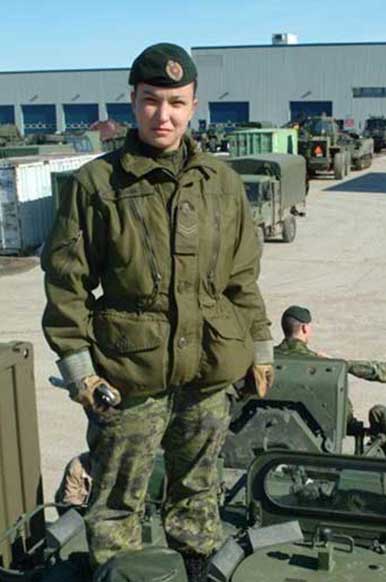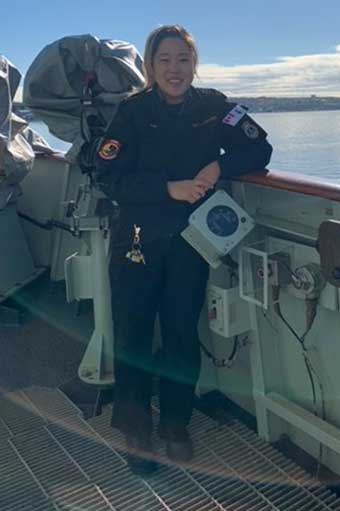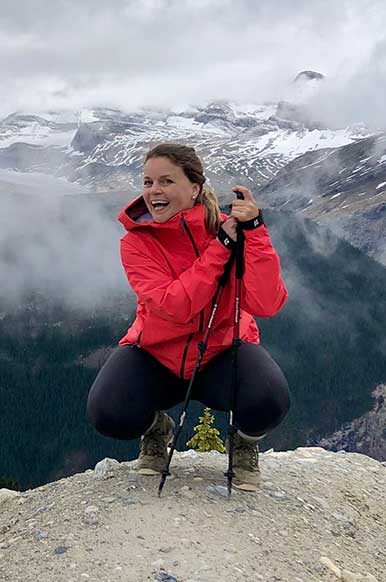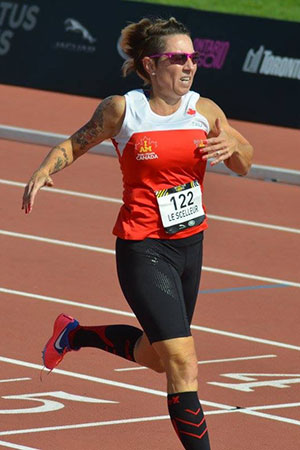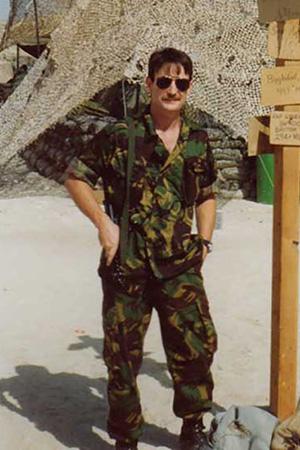
Joined
1991
Postings
- Germany
- Hong Kong
- CFS Debert
- Ottawa, Ontario
Deployments
- Northern Ireland
- Gulf War
- Afghanistan
“My brother had joined three years before me,” Barnes said. “ I heard stories about how exciting everything was, I thought I’d give it a go.”
After completing basic training in Yorkshire, United Kingdom, Barnes chose to be a data telegraphist, leading to six months of specialized training. His first posting was to Krefeld, West Germany, during the Cold War. He would later go on to deployments in Northern Ireland in the late 1970s, followed by additional postings to Germany in the 1980s, where he worked to provide communications for NATO groups until 1986.
By then a senior non-commissioned officer, Barnes returned to England before being posted to Hong Kong with the British forces. Upon his return from the Far East, he spent two years with the 16th Signal Regiment, helping to train soldiers in communications and cryptography.
The rhythm of Barnes deployments changed on 2 August 1990 when roughly 100,000 Iraqi soldiers invaded Kuwait. Soon after the United Nations passed a resolution condemning the attacks, a United States-led coalition of more than 35 countries, including Canada and the United Kingdom, came together in the largest union of forces since the Second World War.
Barnes was among the troops that would go to the Middle East.
“It started in the airport hangar, the general feeling was, this is it, we’re not coming back.”
“I was sent because at the time single people without families were sent first,” says Barnes. “I left for Saudi Arabia with a taskforce sent from North Germany, into Al Jubail, a town on the Persian Gulf coast.”
Barnes recalls the tension and mood of his fellow service members prior to leaving for Saudi Arabia. “It started in the airport hangar,” he says. “The general feeling was ‘this is it, we’re not coming back.’”
This feeling was in part due to the uncertainty at the time about what weapons the Iraqi government had at its disposal.
“All sorts of stories we saw on the news, we thought [they had] chemical weapons,” Barnes says. “The night that the United States sent Intercept missiles into Baghdad, while in Saudi Arabia, we had to live in NBC [Nuclear, Biological, Chemical] suits, under the assumption that [retaliation] was coming.”
After arriving in Saudi Arabia, his signals unit set up their gear, helping to provide communication with British and Coalition command.
While providing communications support for Coalition forces in Saudi Arabia, Barnes and his unit built trenches and shelters to protect against possible SCUD missile attacks, which Iraqi forces were launching at Coalition bases.
“We were euphoric, we knew we were going to be going home soon.”
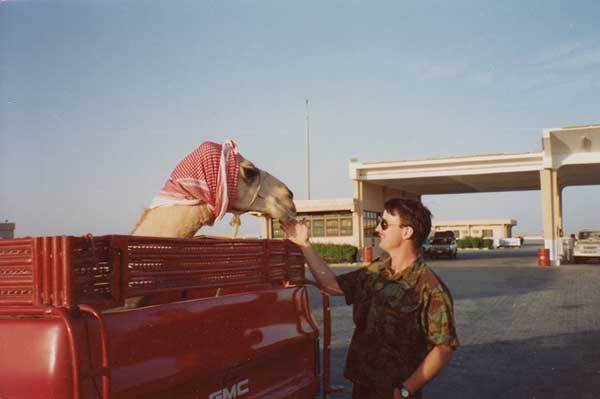
Bruce Barnes in Saudi Arabia during the Gulf War
After a heavy aerial bombardment by Coalition forces, and a swift ground campaign, Iraqi forces were pushed out of Kuwait.
“Oil fields were burning like crazy,” Barnes recalls. When he learned of the United States ceasefire, he remembers the feeling within his unit.
“We were euphoric, we knew we were going to be going home soon.”
Barnes left the Persian Gulf in April 1991. After a few weeks of leave, he returned to a posting in Germany. While there, Barnes applied for a position with the Canadian Armed Forces (CAF). After being accepted into the CAF, he was posted to CFS Debert, a communications facility and medical supply depot in Nova Scotia.
He later was posted to Ottawa before being selected to deploy to Afghanistan in 2006.
For Barnes, the deployment brought back memories of going to war in the Persian Gulf.
“It was the same feeling in the airport before going to Afghanistan as we were waiting to board the plane,” he says.
Initially posted to Kabul, where Canadian forces were stationed at the time, he was later sent to provide communications support at Kandahar Airfield, in the province where Canadian forces had been moved in the spring of 2006.
“It was stressful, there were often rocket attacks,” Barnes says. “I have a little bit of survivors guilt, guys were getting shot at on a daily basis.”
After returning to Ottawa, he became an imagery training officer for soldiers from both Canada and allied nations.
“It was quite rewarding,” Barnes says, “I still keep in touch with those I’ve trained.”
He retired from the Canadian Armed Forces in January 2010, and went on to work as a civilian contractor.
With courage, integrity and loyalty, Bruce Barnes has left his mark. He is one of our Canadian Veterans. Discover more stories.
If you a Veteran, family member or caregiver in need of mental health support, the VAC Assistance Service is available to you 24/7, 365 days a year at no cost. Call "1-800-268-7708 to speak to a mental health professional right now.









